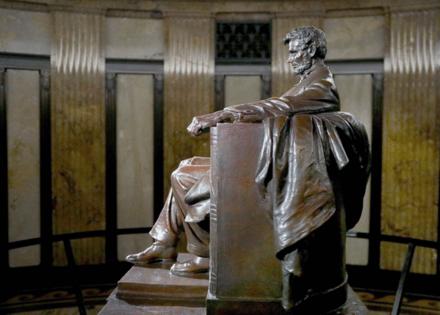Commentary: Abraham Lincoln's empathy is what our divided nation needs
Published in Op Eds
In our era, they might seem like performative gestures for the president. A quiet visit with the wife of a wounded soldier. A conversation with a battlefield nurse or a kitchen worker. A hand extended to a Black woman who had once been enslaved.
Abraham Lincoln didn’t publicize these moments, though. He prioritized them for personal reasons.
Because even as he held the Union together with the force of his will — even as he buried his own child and bore the weight of a nation at war — he made time for mercy. He listened to the voices of those without power, a practice that steeled him for wielding his own.
Empathy is getting a bad rap these days. Elon Musk recently declared it the “fundamental weakness” of Western civilization, summing up the ethos of the administration he just left. Even those who defend empathy speak of it mainly as a private virtue, not one that compels any particular action by public figures.
But in the hands of a great leader, empathy can become a powerful political force. Whenever America has begun to fray — during war, depression, civil upheaval — the country has rallied behind a president who focused on the disenfranchised. If we’re to survive our current crisis of division, our civic leaders need to do the same thing. And, as citizens, so do we.
Maybe that’s why Lincoln’s name keeps rising in our conversations, as historians and storytellers nudge us in this direction. Lincoln is a figure in exhibits, podcasts and intellectual festivals this summer. The Metropolitan Opera is working to produce George Saunders’ moving novel “Lincoln in the Bardo,” a deeply empathetic portrayal of the 16th president. New scholarship further reveals a deeply sensitive and heartfelt man.
In this modern moment of anxiety, they’re showing the way to a better place — or at least the first step toward it.
How did Lincoln cultivate the trait of empathy? Partly by surrounding himself with compassionate people. That’s according to “Loving Lincoln,” a new biography examining his story through the lives of the women who, despite their lack of franchise, were his key influencers.
By his female relatives, Lincoln was nurtured into what his stepmother called “the best boy I ever saw,” historian Stacy Lynn writes. Their stories “offer evidence of Lincoln’s kindness and sensitivity, his patience, his moral center, his social and political virtues, the breadth of his compassion, and his inspirational legacy.”
By far, the deepest relationship of his life was with his wife, Mary, whose steely resolve helped bolster his commitment to freeing enslaved people. She was in favor of emancipation very early on, and she pressed her husband on the issue. The Lincoln White House became a place of mercy and goodwill, in no small part because of the compassion the president showed for his wife in her grief.
He welcomed Black people to the White House. Mary Dines, who worked in the kitchen, urged Lincoln to visit the camps where newly freed families lived, and he went. Elizabeth Keckley, a formerly enslaved woman who became Mary Lincoln’s dressmaker and confidante, called him “kind and generous by nature.”
Lincoln also welcomed Frederick Douglass and Sojourner Truth. “I never was treated by any one with more kindness and cordiality than were shown to me by that great and good man, Abraham Lincoln,” Truth said later.
To meet the gaze of all these people, to shake their hands, to give them audience — these were not symbolic gestures. They were radical acts of inclusion by the leader who kept the Union intact. This is meaningful for us today, in our moment of deep national division.
For those in office, the life of Lincoln is a guideline. He spoke publicly of the need for love and compassion. He surrounded himself with confidantes who embraced it. And he took action on it, ultimately assisting the emancipation of 4 million people from bondage.
Elected officials today can do likewise. They can reject the dogma of hatred in discussing immigration. They can surround themselves with advisers who, even if they favor downsizing government, hold respect for public service and public servants. They can vote and act with care for those on the margins of society.
But the work of public compassion isn’t all on their shoulders. Each of us can train ourselves individually for compassion. A good first step is the one Lincoln modeled all his life. We can start today by using compassionate language, a practice that can lead to feeling it in the heart.
Research shows language doesn’t just express emotion — it can help shape it. Certain practices can actually increase activity in the neural networks that enhance empathy and emotional regulation. Showing empathy to others feels good, too. Compassion, as with charity, begins at home.
Ultimately, though, we have a compassionate responsibility to one another.
So what can we as individuals do to fulfill it? We can reach out to friends and family members with differing perspectives. We can try to talk, understand and share. We can reward kindness in those who seek our votes — this fall, next year and the two after that. We can help change the national tenor by changing our own.
In the grand scheme of things, it was just a few years ago that Lincoln led our country through something much worse than the conflict we’re now experiencing. His example feels even more relevant when we consider how powerfully his words land in our hearts today.
He’s telling us how to bind up the wounds of our nation, “with malice toward none, with charity for all.”
For the love of Lincoln, let’s listen.
____
Christi Parsons is a former Tribune White House correspondent and a longtime political journalist now on the faculty at the University of Maryland.
_____
©2025 Chicago Tribune. Visit at chicagotribune.com. Distributed by Tribune Content Agency, LLC.

























































Comments